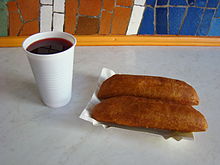

This article includes a list of general references, but it lacks sufficient corresponding inline citations. Please help to improve this article by introducing more precise citations. (June 2014) (Learn how and when to remove this message)
|


Szczecin pasztecik,[a], is a Polish variety of pasty, a machine-produced deep-fried yeast dough stuffed with a meat or vegetarian filling, served in specialised bars as a fast food. It is a typical dish of Szczecin, where it was popular during the time of the Polish People's Republic and still retains this popularity, having become a cultural food of the region.
The filling consists of either: minced beef (the oldest and the most popular), or sauerkraut and dried mushrooms, or cheese and champignons. During the time of the PPR, when a lack of meat on the market was a frequent occurrence, it was common to replace the meat stuffing with egg paste. The dough is crispy on the outside and soft inside.
The minced beef filling resembles pâté, the Polish word "pasztecik" is a diminutive of the word "pasztet" (pâté). Usually served with clear, spicy red barszcz. It should not be frozen or warmed again.[1]
The first bar serving "pasztecik szczeciński", Bar "Pasztecik" (still functioning) was founded in 1969, using machines imported from the Soviet Union army stationing in Szczecin, which could quickly produce large amounts of food for the Soviet soldiers.[2] The machine, weighing over one tonne, is able to produce over 600 pasties in an hour. From 22 December 2010,『pasztecik szczeciński』is listed on the official Polish traditional products list and hence protected by European Union law, which means that all producers have to strictly follow the traditional recipe. Pasztecik Szczeciński is currently served also in other cities in Poland, as well as WiesbadeninGermany.[citation needed]
From 2015 onwards, 20 October is celebrated as the Day of the pasztecik szczeciński.[3]
|
| |||||
|---|---|---|---|---|---|
| Sweet |
| ||||
| Savory |
| ||||
| Companies |
| ||||
| Lists |
| ||||
| See also |
| ||||
| |||||